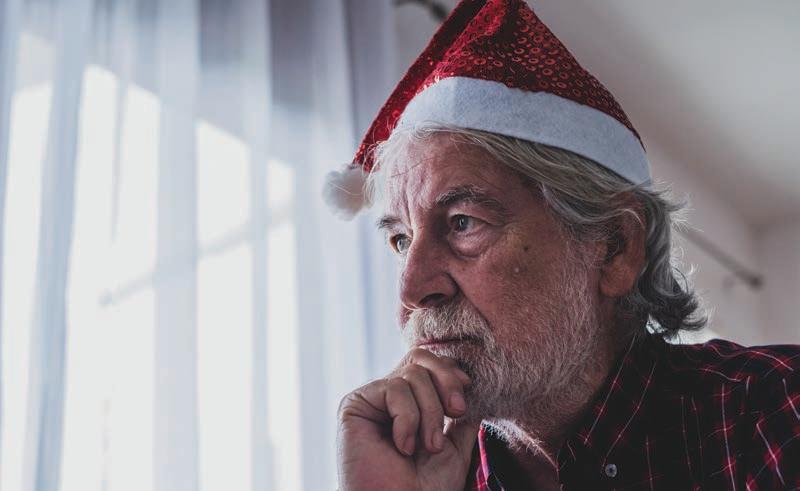
6 minute read
Coping with grief during the holiday season
Coping with grief during the holiday seasonBY DR ELLY WARREN – FRACGP
Christmas, the most wonderful time of the year! As our favourite carols waft through re–opened shopping malls post lock down, our heads spin with excitement, anticipation, joy, generosity, nostalgia, and contentment. The pandemic has taken a toll though this year and many of us may also be experiencing other emotions such as stress, exhaustion, disappointment, apprehension, and apathy, to name a few.
A tendency towards overindulgence in spending, eating, drinking and festivities can increase the stress around the holiday season. We’ve all been deprived of social connections during the pandemic and should go easy on ourselves when venturing back out into the world. This will be even more complicated if you are dealing with loss.
With so much focus on family and friends, this time of year is very challenging if you’ve experienced the death of a loved one. Christmas and other significant anniversaries can trigger grief and intensify the uncertainty, anger, sadness and frustration that comes with losing someone you love. What is socially expected to be a fun holiday season, can become a world of loneliness, guilt, fear, panic, yearning and pain.
There is sometimes an expectation that grief should be put aside during the festive period, that we may be spoiling it for everyone else if we let people know how we really feel. It may be hard for others who haven’t experienced the death of a loved one to understand the huge emotions that threaten to boil over as we try to put on a brave face. The pressure of playing happy families can be extremely distressing.
So how do you get through it all? Christmas and other important cultural celebrations will never be the same after someone close to you dies. While you can’t rush the grieving process, there are things you can do to make the holiday period easier. You may need to challenge your or your family’s idea of the ‘perfect Christmas’ and make sure the experience is meaningful and manageable for you. For some, it may mean not celebrating at all. Acknowledge that the holidays will be different.
TIPS FOR COPING WITH GRIEF OVER THE HOLIDAY SEASON
Try and spend time with people who are supportive of you. Decide which traditions you want to keep and those you want to change. Maybe create a new tradition in memory of your loved one. Light a special candle in their memory. Play your loved one’s favourite music. Consider expressing your feelings in a creative way, such as artwork or writing. Consider doing something you would not usually do in memory of the deceased. Make a donation in their name, plant a tree or perhaps do some volunteer work. Fill a stocking with memories of your loved one and allow others to contribute. Write a letter or a card to the person who has died, don’t be concerned if you want to talk out loud to them... do it. Visit the graveside or a special location to sit and remember.
Lay a wreath, flowers or a meaningful item for them. Share your memories with someone else, the photos and the stories. Don’t be afraid to laugh as you remember some of the good times. Do something that makes you feel good. It may be as simple as reading a magazine, going for a walk, listening to music, fishing, getting a massage or enjoying a cup of coffee at your favourite cafe. Plan your time so that you are under as little stress as possible. Plan how to keep things simple and gentle. Ask for some assistance with preparations including going shopping, preparing gifts and meals. Say YES to people who want to help and may offer their support. Take them up on their offers. You might want to write a journal, making a note of what worked and what did not. Be honest. Tell people what you do and do not want to do for the holidays. Listen to yourself, trust yourself, communicate with your family, and do what works for you. Ensure some quiet time. It’s OK to miss events if you don’t feel up to going. Take time out when you need it. Get at least 20 minutes of sunlight and fresh air every day. Exercise most days of the week for at least 30 minutes. Prioritise sleep and minimise alcohol. Remember that it’s OK to be happy during the festive season.
Enjoying the holidays does not diminish how much you love and miss the person who isn’t here. If you are finding it difficult to manage on a day–to–day basis, see your friendly GP, who can help link you in with a counsellor or psychologist.
HELPING SOMEONE WHO IS GRIEVING
Be a good listener – Grieving people need to talk about their loss and acknowledge that they have been through a difficult experience.
Be a shoulder to cry on – Allow the person to cry with you if they want to.
Be in touch with them – Visit the person or call them. Let them know you’ve been thinking of them. Send an SMS, letter or email, remember their special days like birthdays and anniversaries.
Be a friend – Often just being there is all that is needed to support someone who is grieving. Everyone’s journey through grief is different and can last a long or short time. Don’t be afraid to speak up if you think your friend needs help.
Be flexible – Be understanding and supportive if someone wants to do things differently this holiday season. Some people find strength in long established traditions while others may choose to avoid customs of the past and do something new.
Be helpful – Offer to help with specific activities such as collecting groceries, preparing meals, mowing the lawn, or delivering presents. Try not to saying ‘let me know if I can do anything.’ It’s hard enough for the grieving person to accept help and far too hard for them to think of an actual task to delegate to you.
Check in after the holidays – The festive season is difficult when you’re grieving, but the post holiday period can be just as tough when everyone else goes back to their usual lives. The grieving person will be adjusting to their new life year round.
Sources: NALAG, National Association for Loss and Grief NSW, Palliative Care Australia.
24/7 NATIONAL CRISIS SUPPORT LINES Suicide Call Back Service: 1300 659 467 Lifeline: 13 11 14 Beyond Blue: 1300 224 636
Useful websites and resources: www.nalag.org.au www.grief.org.au www.mygriefassist.com.au
For support helping kids and young people through grief, visit the National Centre for Childhood Grief at www.childhoodgrief.org.au or Good Grief at www.goodgrief.org.au
Elly enjoys being a GP at Your Family Doctors at Erina and Yerin Eleanor Duncan Aboriginal Health Centre. She cycles huge distances to raise money for cancer research, support and prevention. Check out her ‘What should I know about cancer?’ series on Instagram @drelly_warren and ‘Dr Elly’s Tour de Cure adventures’ on Facebook @drellystdc. Her newest project, Alpine Everesting, will take her to Bright, Victoria in Jan 2022, where she will ride 500km in 36 hours to improve cancer outcomes for Aboriginal and Torres Strait Islander people. You can donate at www.alpineeveresting.com.au
Caring for families since 1843 Locally Owned & Operated
Prepaid funerals available Lock in the price today Document your wishes

24/7 Care Line 1300 130 955




